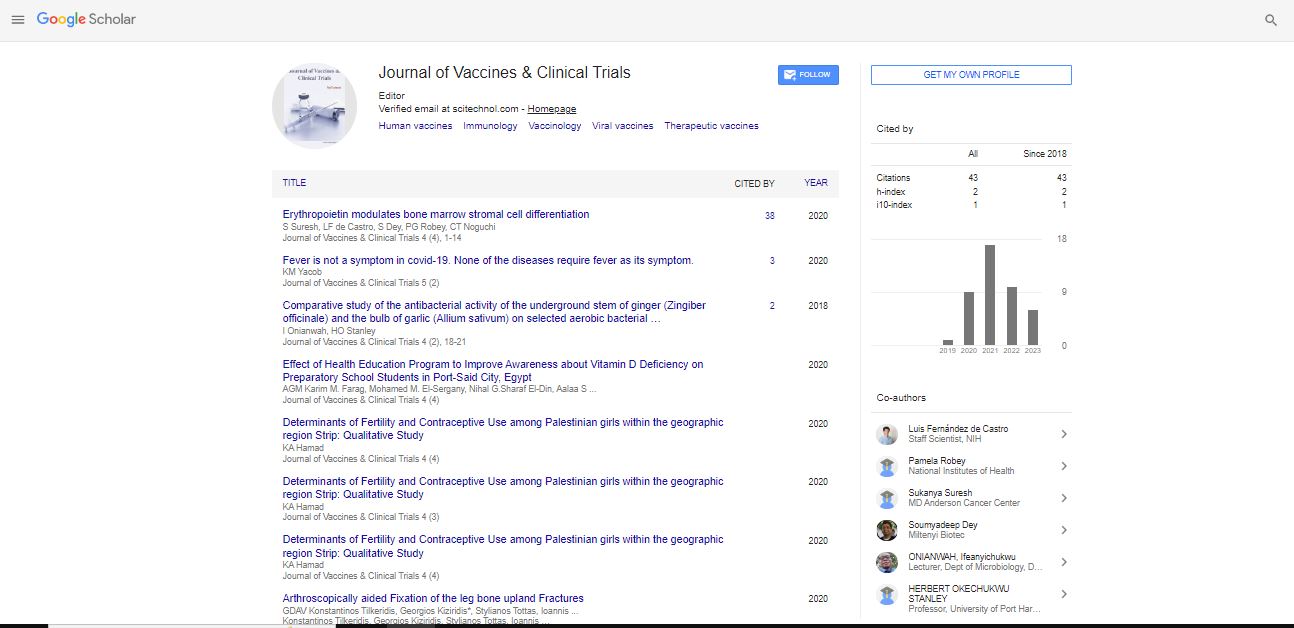Nanovaccines for infectious diseases delivered via microneedle patches
Martin D’Souza
Mercer University, USA
: J Vacc Clin Trials
Abstract
The D’Souza Vaccine Nanotechnology Laboratory at Mercer’s College of Pharmacy has been working on the design and delivery of microparticulate vaccines for infectious diseases. This presentation will highlight the triumphs and tribulations of this rather innovative, in-expensive and painless method of vaccine delivery using microneedle technology. Our patented technology is rather broad based and can be used to administer multiple vaccines in a single microneedle vaccine patch applied to the skin much like a “band-aid-patch” We have been working on particulate vaccines for several infectious diseases such as a) universal influenza, b) HPV, c) RSV, d) meningitis, e) gonorrhea, and f) measles vaccines designed for delivery via microneedles. In this presentation, the results of these vaccine prototypes will be discussed. The vaccine antigen was formulated in bio-degradable and bio-compatible matrices to prepare nanoparticles or microparticles using a spray dryer. These nano-vaccine particles were administered using micro-needles via the transdermal route. Serum samples were obtained at regular intervals in-order to determine the antigen specific antibody responses (such as IgG, Igg1to assess the systemic immunity. Animals were challenges with live virus/bacteria to determine the level of protective immunity developed after vaccination. Further, we examined the expression of co-stimulatory molecules that impact antigen presentation in an in-vitro system using human macrophages pulsed with the antigen. In-order to determine the correlates of protection by the vaccine in-vivo, the total IgG and its subtypes IgG2a and IgG2b were measured after immunizing mice. The up regulation of other co-stimulatory molecules such as CD-40, CD-80 and CD-86 were also determined. In conclusion, the novel nano-vaccines are robustly taken up by antigen presenting cells and up-regulate co-stimulatory molecules that enhance antigen presentation, which is a pre-requisite for inducing adaptive immunity.
Biography
Martin D’Souza has obtained his PhD degree from the University of Pittsburgh, PA, USA. He is a Professor and Director of Graduate Programs in the College of Pharmacy at Mercer University in Atlanta, Georgia. He also serves as the Director of Mercer Clinical Laboratory and Co-Director of the Center for Drug Delivery Research. He has graduated over 50 PhD students and has published over 100 manuscripts. He has been the recipient of several research grants from the National Institutes of Health (NIH), the American Diabetes Association, the Georgia Cancer Coalition, and Georgia Research Alliance. He serves on several Editorial Boards and is a journal reviewer for over 10 scientific journals and has several patents issued in the area of Nanotechnology.
E-mail: dsouza_mj@mercer.edu
 Spanish
Spanish  Chinese
Chinese  Russian
Russian  German
German  French
French  Japanese
Japanese  Portuguese
Portuguese  Hindi
Hindi 